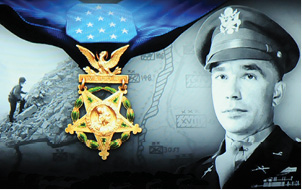Trailer for Murl Conner documentary ready for viewing, release probable next month

By Al Cross
Seventy-five years ago last week, a soldier who had been in combat for more than two years, suffering many wounds and earning four Silver Stars, offered the ultimate sacrifice — calling in artillery on his forward position, to save his battalion.
Garlin Murl Conner survived that day in a ditch in the French province of Alsace and came home to a Kentucky farm with no electricity or running water. He had a family, gave them a good life and was a leader of his fellow farmers and veterans. He suffered in body and mind from his Army service, but said very, very little about it.
Only after Conner died in 1998 was his story told — first by a rank stranger who became his greatest advocate and inspired others to join his campaign to get Conner the Medal of Honor. Led by a neighbor who wouldn’t take no for an answer, they struggled for 20 years to break through the Army bureaucracy, losing at every turn — but remaining inspired by Conner’s battlefield examples of determination and resolve.
In the end, in an amazing turn of events, they won. And now their story is being told, along with the story of Lt. Conner, who we now know may have been the most decorated American soldier of World War II.
“From Honor to Medal: The Story of Garlin M. Conner” is an hour-long documentary to be released in March by the Institute for Rural Journalism and Community Issues within the College of Communication and Information at the University of Kentucky. It will tell the story of Conner’s life and the campaign to honor him.
“He was a combination of Kit Carson and Davy Crockett,” says Walton Haddix of Albany, Kentucky, who took up the campaign begun by Richard Chilton, a Green Beret veteran from Genoa City, Wisconsin, who met Conner and learned his story while researching the service of his uncle, who died at Anzio under Conner’s command.
“He cared about his men more than anybody I ever knew,” Chilton says. “If you want to save your life, go out with Murl. Don’t go out with anybody else.”
The documentary is sponsored by private donors and the Veterans Trust Fund of the Kentucky Department for Veterans Affairs, which assisted the Conner team’s legal efforts at the direction of then-Commissioner Heather French Henry, whose cause was veterans when she was Miss America.
She says in the documentary, “Just to know that you are part of this great mission that has lasted so long, and that you could at some point in your future, tell your kids, tell your grandkids, that once upon a time you were part of this fight . . . ”
The fight ended June 26, 2019, when President Donald Trump presented the Medal of Honor to Conner’s widow, Pauline Conner. She still lives on their small farm in Clinton County, just down the road from their son Paul. She said in a speech at the Pentagon the next day, “This is what Murl would want me to say: God bless these United States of America.”
A trailer and a “teaser” for the documentary is online at www.honortomedal.us, along with information about Conner and some of the major players in the effort to get him the nation’s highest military honor.
The film is written and directed by Jeff Hoagland of Lexington, who has helped produce, write and edit documentaries that appeared on KET, the American Heroes Channel (formerly the Military Channel) and the National Geographic Channel. The associate producer is Janet Whitaker, formerly of KET and the Institute for Rural Journalism and Community Issues.
The institute’s director, UK School of Journalism and Media Professor Al Cross, is executive producer.



